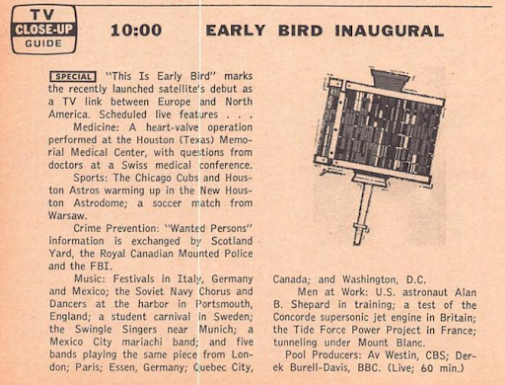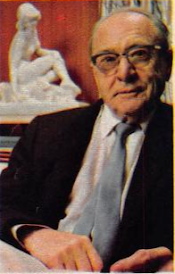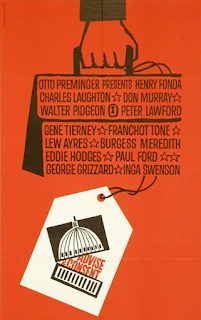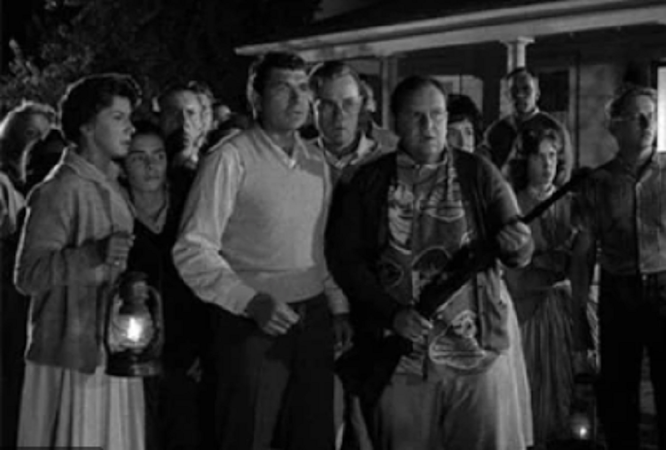If you're my age or a little older, and come next month I'll be a little older than my age now, you probably remember the two words: "Early Bird." Not as in "The early bird gets the worm," which was only useful when your mom was trying to get you up for school, but the Early Bird communications satellite, which presented equal parts interest for television fans and space enthusiasts alike.
Early Bird, formally known as the Intelsat I, is the world's first commercial communications satellite; it was launched on April 6 to provide a TV link between Europe and North America, and this Sunday it's ready to go online, with a live 60-minute broadcast on all three networks at 10:00 a.m. PT. The broadcast showcases, appropriately, several events utilizing new age technology: a heart-value operation performed in Houston by Dr. Michael DeBakey, shown live for an audience in Geneva, Switzerland, who were able to ask Dr. DeBakey questions in real time; the Chicago Cubs and Houston Astros warming up for their game in the new Houston Astrodome, which had just opened the previous week; astronaut Alan Shepard in training; a test of the Concorde supersonic jet engine in Britain; and a variety of musical presentations, including bands playing the same piece from five different cities.
Early Bird programming continues on Monday morning, as NBC's Today originates live from London (7:00 a.m.), where Hugh Downs moderates a discussion between Members of Parliament and congressmen in Washington, and Frank Blair reports the news. Meanwhile, Barbara Walters is in Paris coveraing a fashion show; Jack Lescoulie tours a children's village in Amsterdam; and Aline Sarrinen discusses early Roman architecture from Caroline Hill in the Eternal City. At noon, CBS presents the first live Town Meeting of the World, with a panel including Secretary of State Dean Rusk, former presidental candidate Barry Goldwater, and former British Prime Minister Sir Alec Douglas-Home, as they discuss Vietnam; the program will be repeated at 10:00 p.m. NBC's Chet Huntley broadcasts the Huntley-Brinkley Report from London, and Peter Jennings does the same with ABC's evening news. Huntley also joins BBC newsman Richard Dimbleby (who reports from New York) on Panorama (7:30 p.m., NBC) to discuss the stories they've covered during their long careers. All of these programs are live broadcasts which are shown on tape delay in the Pacific time zone, where this week's issue originates.
Of course, we're used to this kind of thing today, but it was extraordinary back in 1965, and there was something exciting about seeing "live via Early Bird satellite" appear at the beginning of a broadcast. Initially, the networks were allowed free use of Early Bird, which resulteds in live coverage of all kinds of events, from the 24 Hours of Le Mans in June to the splashdown of Gemini 6 in December. (Of course, once Comsat announced their intention to start collecting fees for Early Bird's use, some of that extraneous coverage stopped) Early Bird had only 240 voice circuits, so it could only transmit one TV channel at a time. Soon there would be more satellites up there; Early Bird itself was only designed to operate for 18 months, but lasted until January 1969. It was reactivated that June for the Apollo 11 mission when another of the Intelsat satellites failed, and one last time in 1990 to celebrate the 25th anniversary of its launch. It's still up there, in case you ever get a chance to loook it up.
l l l
 During the 60s, the Ed Sullivan Show and The Hollywood Palace were the premiere variety shows on television. Whenever they appear in TV Guide together, we'll match them up and see who has the best lineup.
During the 60s, the Ed Sullivan Show and The Hollywood Palace were the premiere variety shows on television. Whenever they appear in TV Guide together, we'll match them up and see who has the best lineup.Sullivan: Ed’s scheduled guests are comedians Sid Caesar and Nancy Walker, who appear in a sketch; the Rolling Stones, British rock ‘n’ rollers; songstress Leslie Uggams; comedienne Totie Fields; British singer Tom Jones; Morecambe and Wise, British comedy team; and contortionist Gitta Morelly.
Palace: The host is jazzman Louis "Satchmo" Armstrong, who is saluted for his 50 years in show business and his role as a traveling goodwill ambassador. Actor Edward G. Robinson reads tributes from the President and the Senate, and other accolades are offered by guests Jimmy Durante, blues singer Diahann Carroll, comics Rowan and Martin and the Ballet Folklorico of Mexico.
 Throughout the 60s and early 70s, TV Guide's weekly reviews were written by the witty and acerbic Cleveland Amory. Whenever we get the chance, we'll look at Cleve's latest take on the shows of the era.
Throughout the 60s and early 70s, TV Guide's weekly reviews were written by the witty and acerbic Cleveland Amory. Whenever we get the chance, we'll look at Cleve's latest take on the shows of the era.
Sometimes weekly lineups underwhelm. There's nothing wrong with that, it's just the way showbiz is; you can't have a superstar lineup each week. Ah, but this week, who ya gonna pick? Sid Caesar, the Stones, Tom Jones and others, or Satchmo, Eddie G., The Schnozzola, and a message from POTUS? You can't go wrong either way, but even though this isn't the infamous Stones appearance that got them banned from Sullivan, I think I have to give the nod to Ed. That's just my opinion, though—if you're not sure, you can see ten minutes of the Stones and Tom Jones from Sullivan, and you can compare that to the Palace show and see what you think.
l l l
 Throughout the 60s and early 70s, TV Guide's weekly reviews were written by the witty and acerbic Cleveland Amory. Whenever we get the chance, we'll look at Cleve's latest take on the shows of the era.
Throughout the 60s and early 70s, TV Guide's weekly reviews were written by the witty and acerbic Cleveland Amory. Whenever we get the chance, we'll look at Cleve's latest take on the shows of the era. Every MST3K fan out there knows that Gypsy's hero is the one and only Richard Basehart. He's also the hero, or one of them, on the show in Cleveland Amory's bulls-eye this week: Voyage to the Bottom of the Sea. And guess what? He doesn't hate it! I know; that sounds like faint praise, but he says your children will love it and, more often than not, it will give you some escape. "And these days, that's not too bad, television fare being what it is."
Casting Basehart as Admiral Harriman Nelson was, I think, a stroke of genius; he was a familiar face from both television and the movies, and he projects a gravitas and dignity that is often missing from these kinds of shows. Amory finds him "admirable," [sic] and he plays the role straight, which, "considering the plots and dialog" isn't easy. David Hedison co-stars as Captain Lee Crane, and even though he was offered (and declined) the role of Crane in the original movie version, Amory finds him a less successful character—"possibly because, the way his role is written, he doesn't seem to have any." The remainder of the supporting cast, as well as many of the guest stars, fare better.
One episode in particular seems to have captured Cleve's fancy; it concerns a mission that Nelson and Crane leave the Seaview to undertake; they wind up on an island, where they encounter a mad scientist and a general from the People's Republic of China, back when it was still permissible to portray them as part of the evil empire. "Something is watching us," Nelson tells Crane, and sure enough—the mad scientist has been following their every move via closed-circuit television. "In fact," Amory notes, "from that time on, the entire episode turns out to turn on whether or not the boys are going to be able to turn off their own show." It sets up for a thrilling conclusion—but if you think you're going to read about it here, you're mistaken. Says Cleve, "if you think we’re going to spoil the summer rerun of this gem for you, we’re not."
l l l
The first Saturday in May tells us it's time for the annual "Run for the Roses," and since this Saturday is May 1, it's off to Churchill Downs in Louisville for the 91st Kentucky Derby (2:00 p.m., CBS). This year's winner is one of the lesser-known Derby victors, Lucky Debonair; he was injured in the Preakness and didn't run in the Belmont. Saturday night, as is always the case in this television season, Jim Backus goes up against himself; he's the voice of Mr. Magoo (8:30 p.m., NBC), whose famous adventure this week is "Moby Dick"; he's also Thurston Howell III in Gilligan's Island (8:30 p.m., CBS). It's the only time in television history that the same actor has appeared on two different networks in two different shows scheduled against each other. And for late-night movie fans, there's a Ronald Reagan double feature; Hellcats of the Navy (11:20 p.m., KPIX) stars the Gipper and wife Nancy; while in The Winning Team (midnight, KTVU), he plays baseball star Grover Cleveland Alexander. Dutch also features in possibly his best-known role, that of Drake McHugh, the man whose legs are amputated, in Sunday's Kings Row (11:35 p.m., KTVU). His famous line from that movie, "Where's the rest of me?" will also be the title of Reagan's first autobiography.
During the mid-1960s, ABC featured a number of stars acting as tour guides of their native country; Elizabeth Taylor in London in 1963, Sophia Loren in Rome in 1964, and Inger Stevens in Sweden just this last February. Tonight, it's Melina Mercouri's Greece (9:00 p.m., ABC), "a fascinating hour with this glamorous star in her native land." That goes up against The American West (9:00 p.m., NBC), as Lorne Greene goes on location to tell the story of Ben Cartwright's native land, the Old West. Oh, and Tom Bosley plays a man claiming to be a leprechaun in Ben Casey (10:00 p.m., ABC). Coincidentally, there's also a leprechaun at the heart of the 1948 movie Luck of the Irish (11:00 p.m., KPIX); in this case, Cecil Kellaway is the leprechaun; he'd get an Oscar nomination for Supporting Actor for his performance. And it isn't even St. Patrick's Day—what are the odds?
Tuesday night is the farewell episode of That Was the Week That Was (9:30 p.m., NBC), which never caught on in this country the way its British counterpart did, even with the presence of David Frost. Nancy Ames, Buck Henry, and Pat Englund are also part of this final show; its replacement will be the anthology series Cloak of Mystery, "a series of rerun dramas."
Wednesday sees the premiere of Our Private World (9:30 p.m., CBS), a spin-off from As the World Turns, with Eileen Fulton reprising her role as Lisa Hughes. Don't know if you remember, but our very own Cleveland Amory shared his thoughts about the show in this issue. Airing on both Wednesday and Friday nights, Our Private World is CBS's attempt to compete with ABC's Peyton Place, but the ratings are apparently private as well; the series only lasts until September, berfore Lisa returns home. My, doesn't she look young here?
And here's a show we desperately need now: "The Solutions to all the World's Problems in 53 Minutes and 27 Seconds," this week's edition of The Open Mind (Friday, 9:00 p.m., KQED), with host Eric Goldmen's guests, cartoonist-satirist Jules Feiffer, author Marya Mannes (whom we're read in this space before), actor-comedian Milt Kamen, and author Paul Krassner.
l l l
Following up on last month's cover story about Vince "Ben Casey" Edwards, Henry Harding reports this week that Sam Jaffe, who plays Casey's mentor Dr. Zorba, is leaving the series. There's no mention of Edwards in the story; Harding simply says that Jaffe "has long been bored with the role and eager to relinquish it," and quotes Jaffe as saying he's "So, so happy!" to be leaving. "Why not? I didn't have enough to do. It was like the Chinese water torture." Later on, we'll find out that Edwards' unprofessionalism played a large part in Jaffe's departure.
That's not the only departure in this week's industry review. It's the last roundup for Eric Fleming, who's riding into the sunset on Rawhide, leaving Clint Eastwood to head up the show. Fleming is one of several regulars departing the series; Eastwood and Paul Brinegar (Wishbone) will be joined by some new characters for the coming season, which will be the series' last.
Ever wonder what those stars do when their series ends? TV Teletype tells us that these stars of old TV series are soon to appear in new ones: Robert Conrad (Hawaiian Eye) heads for The Wild, Wild West; Edmond O'Brien (Sam Benedict) is in store for The Long, Hot Summer; Peter Brown (Lawman) stays in the west in The Streets of Laredo; and Richard Long (Bourbon Street Beat and 77 Sunset Strip) will be in The Big Valley with Barbara Stanwyck (The Barbara Stanwyck Show). But let's not forget Dennis James, "who has probably been on more panel shows than anybody," has been signed as host/emcee of a new one, Silent Partners. Unfortunately, it never makes it past the pilot.
l l l
Finally, among the missing in action this week is Wendy and Me, the ABC-Warner Bros. sitcom starring Connie Stevens and George Burns, preempted this week for the aforementioned Melina Mercouri special. The show's charm, writes Richard Warren Lewis, is in its resemblance to the old Burns and Allen series, with Connie assuming the scatterbrain role of Gracie Allen. However, not all of the nation's viewers shares Lewis's assessment of the show; its ratings, up against Lucille Ball and Andy Williams, have lagged all season, and last month it was missing from ABC's 1965-66 schedule.
Don't shed any tears for her, though; "she has decorated more than 200 covers of fan magazines and once was named among the Nation’s most admired women in a Gallup poll," and she admits that the thought of being in a long-term series panicked her; "I just don't have the emotional capacity to stick with something for that long." One wonders if that includes marriage; after recounting this tidbit, Lewis goes on to mention her two-year marriage to actor James Stacy. Although Stacy had completed a movie with Hayley Mills just before the marriage, he hasn't been that active lately—and Stevens has. "My wife has given me two more years to support me," Lewis reports Stacy as having confided to friends. And about Connie, he says, "I've learned to live with her." (They would be divorced next year.)
She's determined to succeed in the business (Hedda Hopper calls her "an apple blossom with the wham of a bulldozer") and she lobbied hard for the role of the young wife in the movie version of Who's Afraid of Virginia Woolf, which eventually went to Sandy Dennis. She was frustrated during her years on WB's Hawaiian Eye that she wasn't allowed to take on more substantive roles or perform in night clubs. and when she refused to go on a personal appearances tour, Warners suspended her. (It was settled "amicably"). Even though her new Warners contract permits those nightclub apperances, and allowed her to appear earlier this season on The Hollywood Palace and The Red Skelton Hour, she still remembers the dispute. "I haven't worked with that many great actors," she says of her time with WB. "I've been with Warner Brothers for too long."
For all this, Connie Stevens looks forward to the future. She's concentrating on displaying a more mature image (she wears fashionable hats, appears ceaselessly at charity events, and even hired a full-time personal manager). And she doesn't read the fan magazines anymore,even though she does look at the pictures. "And still I get upset, because I don't look like Elizabeth Taylor." Not to worry, though; her second marriage is to Liz's ex-husband, Eddie Fisher. The next-best thing, I suppose. TV






























